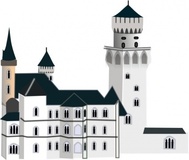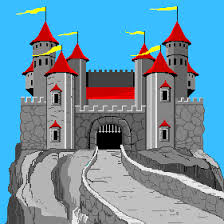 I am happy to report that my French 2 students are enjoying their unit on castles as much as I had hoped they would. While I was surprised by how little background knowledge they seemed to have about medieval history, they have expressed genuine interest in the information they have learned from the readings and videos. Considering that we have had atypical class schedules every day to allow for standardized testing and weather delays, I’d say that their attention in class has been downright formidable!
I am happy to report that my French 2 students are enjoying their unit on castles as much as I had hoped they would. While I was surprised by how little background knowledge they seemed to have about medieval history, they have expressed genuine interest in the information they have learned from the readings and videos. Considering that we have had atypical class schedules every day to allow for standardized testing and weather delays, I’d say that their attention in class has been downright formidable!
Because I want the students to become familiar with some castles that I visit when leading student trips, I wanted to include a few lessons on the Renaissance and some specific Loire Valley castles in this unit. So following the lessons which I included in my first post about this unit, I am implementing the lesson included here: Renaissance Lesson
As the document shows, the students will read three pages from a children’s book on the Renaissance (Renaissance p. 4, Renaissance p. 5, Renaissance p. 18) and complete an IPA-style interpretive task. Following this task, they will complete an information gap activity in which they discuss their versions of a royal family tree in order to fill in the missing facts on their copy. Family Tree Speaking They will then write a short biography about the Renaissance king of their choice.
Following this lesson, the students will complete a series of learning stations designed to familiarize them with the Loire Valley castles. Due to the nature of the materials (teacher-made games, manipulatives, commercial video and authentic brochures) I can’t include them here, but I’ve included a short description below:
Listening Station: The students will watch a non-authentic Loire Valley castle DVD from Teacher’s Discovery and answer comprehension questions.
Reading Station: Students will read a series of brochures that I’ve brought home from visits to the Loire Valley and answer comprehension questions.
Castle Identification Station: Students will play a series of games that I’ve either made or purchased which are designed to teach them to recognize various Loire Valley castles.
Speaking Station: The students will converse in order to fill in a graphic organizer with information about various Renaissance kings.
After these stations, the students will complete this IPA about the French Renaissance and Loire Valley castles Castle Unit IPA
Reading: The students will read several pages from a children’s book about Chambord (Chambord pp. 1, 2, Chambord pp. 3, 4, Chambord pp. 5, 6) and complete an interpretive task.
Listening: The students will watch an authentic video and provide details to demonstrate their comprehension.
Speaking: The students will converse in order to fill in a graphic organizer about Francis I.
Writing: The students will write a chapter of Francis I’s memoir in which he describes what his life was like when he was king.
As always, I’m grateful for any feedback on these lessons and materials!

